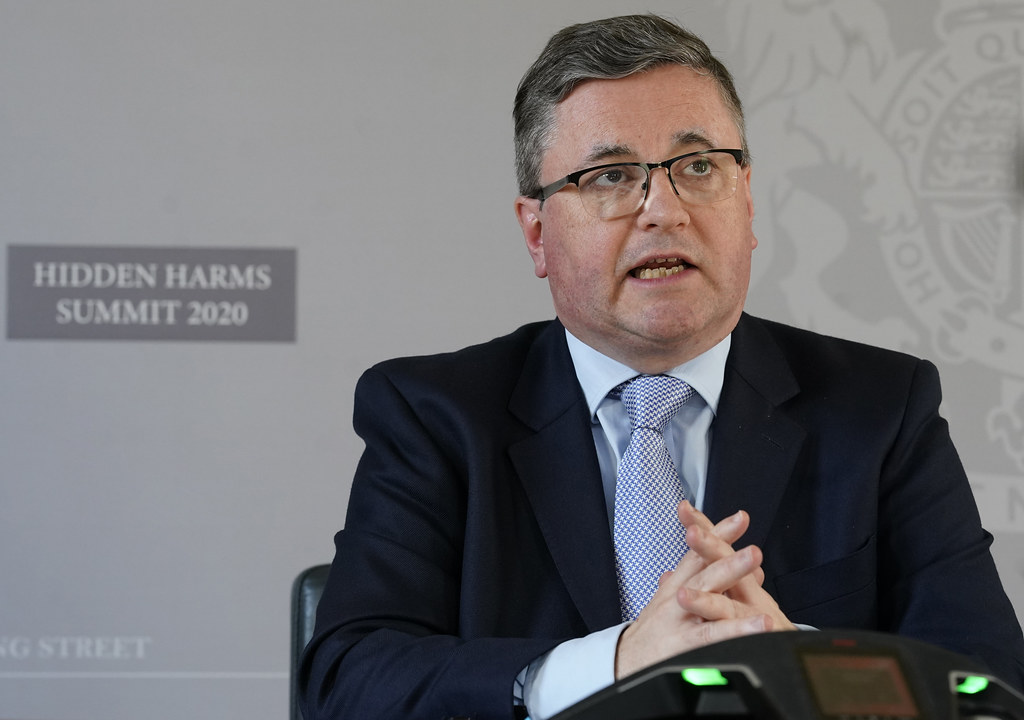Lord chancellor Robert Buckland QC has confirmed the government will commission an independent review of the Human Rights Act, almost a year after the Conservative Party made a “vague” manifesto pledge to “update” it. In the past 11 months, reports have hinted at what this ‘update’ could entail. EachOther examines what we know so far.
What’s the Human Rights Act (HRA) again?
The HRA was passed by Parliament in 1998 and came into force two years later. It brought the protections of the European Convention on Human Rights (ECHR) – which Britain played a key role in drafting – into domestic UK law.
The Act enables us to go to our local courts to enforce our rights – such as our right to free expression or freedom from torture – rather than having to go to the human rights court in Strasbourg. It marked its 20th anniversary of coming into force on October 2.

British troops gather at Kandahar Air base to pay their respects during a service of Remembrance in November 2014. Credit: Defence Images / Flickr
In the past two decades, the HRA has been used to protect the rights of countless people in the UK.
Among them are the bereaved families of British soldiers killed by roadside bombs in Iraq and Afghanistan. They successfully challenged the Ministry of Defence over its use of lightly armoured Snatch Land Rovers – dubbed “mobile coffins” – on grounds of the soldiers’ right to life.
More recently, the Act is being used to challenge the government’s handling of the coronavirus crisis in care homes and to hold public authorities accountable over the Grenfell tower disaster.
Why does the government say it needs to be ‘updated’?
Official statements from Downing Street have offered some explanation as to why it believes the HRA needs updating.
Last year, the government said it would update the Act to prevent what it describes as “vexatious” legal cases against former soldiers accused of human rights abuses before the Act came into force in 2000. Lawyers at the time questioned whether such a move would have any legal impact.
Boris Johnson also took aim at the Act in the aftermath of the terror attack in London Bridge last year, claiming that it places restrictions on surveillance of terrorists. However the right to privacy is qualified, which means states can take proportionate and lawful measures to encroach into private lives if necessary to protect national security and public safety.
In recent weeks, the PM and the home secretary have also pejoratively referred to human rights lawyers as “activists” and “lefties” for doing their jobs, such as defending asylum seekers and migrants in court cases where the government is seeking to deport them.
Earlier this month, the Lord chancellor reaffirmed the government’s commitment to updating the Act in a letter to Harriet Harman MP, chair of parliament’s joint human rights committee.
He wrote that the update is part of the Conservative’s 2019 manifesto pledge to “look at the broader aspects of our constitution including the balance between the rights of individuals and effective government”.
Previous Conservative Party leaders, dating back to 2015, have pledged to scrap the Human Rights Act altogether and replace it with a British Bill of Rights.
Johnson’s special adviser Dominic Cummings has also expressed a wish to leave the ECHR following Brexit in his personal blog.
In September, Buckland told Times Radio the idea that the UK would leave the ECHR is “for the birds”, but said the HRA needed to be “looked at carefully”.
Is the European Union (EU) involved?
The EU and the ECHR are two totally different things.
The ECHR is upheld by the Council of Europe, which was founded in the aftermath of World War Two as part of a pledge to ensure the atrocities of the war never happen again. It was drafted with the support of Conservative British lawyers.
The EU, on the other hand, began life as a way of promoting economic growth and cooperation between European states in the 1950s.
Nevertheless, the UK’s relationship with the ECHR has become entangled in the UK’s ongoing negotiations with the EU following Brexit.
On September 12 the Telegraph, citing anonymous government sources, reported the UK was planning to opt out of key aspects of the ECHR to enable it to speed up the deportation of asylum seekers and protect British troops from legal action.
But last Wednesday the Guardian, citing anonymous EU sources, reported that Boris Johnson would agree not to “rip up” the Human Rights Act in order to secure its security ties with the union.
The EU has since the start of the trade and security negotiation said that future cooperation on internal security would be conditional on a written commitment that the ECHR would continue to apply.
And so any updates the government attempts to make to the HRA may be influenced by these negotiations.
How will the independent HRA review work?
Details of the forthcoming independent review of the HRA, and who will conduct it, are sparse. In his October letter, Buckland has said the details will be announced “in due course”.
The Tory’s 2019 manifesto pledged to convene a “Constitution, Democracy and Rights Commission” in its first year in government to recommend proposals on how to update the HRA among other aspects of the country’s constitution and institutions. The document suggests that these proposals will not be looked at until “after Brexit”.
Former Lord chancellor Geoffrey Cox QC in February was tipped to lead this new government commission. However last month he criticised the government over its Internal Market Bill, which it admitted breaches international law.
The government has already established a separate independent panel of experts to examine judicial review (JR) – the means through which the courts assess the lawfulness of decisions made by public authorities, often in relation to human rights.
It is led by Lord Edward Faulks QC, along with five other esteemed legal experts. There are concerns over Faulks’ impartiality on the subject – as a former Conservative justice minister who has written critically about JR.
Should we be worried?
Reports of how the UK government may seek to update the HRA, or opt out of aspects of the EHRC, have sparked fear among civil liberties groups.
Since announcing its plans to protect soldiers from “vexatious” litigation last year, the government has introduced the Overseas Operation Bill. This law, if passed, will place a six-year time limit on people bringing civil claims against the military for offences including torture or unlawful killing. It will also become “practically impossible” to prosecute members of the Armed Forces who are charged five years after an alleged offence, campaigners warn.
Buckland has insisted the Bill does not “undermine the UK’s commitment to human rights and the ECHR”. Under Article 2 of the ECHR, which protects our right to life, states can be required to investigate deaths where there has been potential state complicity.
Steve Crawshaw, Director of Policy and Advocacy at Freedom from Torture, told EachOther the bill could let British soldiers “off the hook” for committing crimes abroad.
“Britain has a history of helping to establish human rights protections across the globe. These hard-won rights are being used for political ends. The abandonment of human rights and restrictions placed on international law will affect us all,” he added.
Following reports in September of the government’s intention to opt-out of the ECHR, Bella Sankey, director of migrant rights charity Detention Action, told EachOther: “A government that trashes the rule of law and repeals its human rights legislation is weak and insecure, lacking the courage for complex statecraft and scared of constitutional challenge.
“Attacks on the rights of migrants are not new, but what we have learned over the past twenty years is that it’s not long before the rights of all are then chipped further away.
“All those that believe in democracy and freedom should resist these odious plans”.

